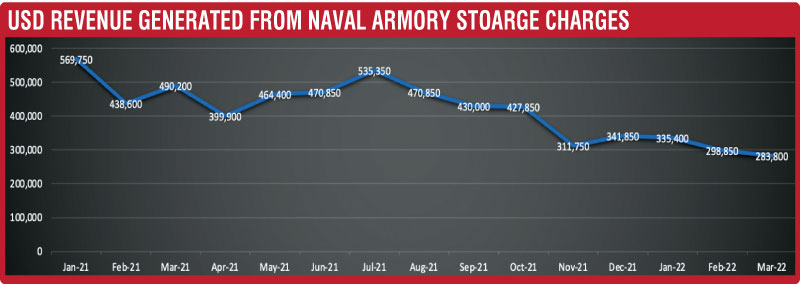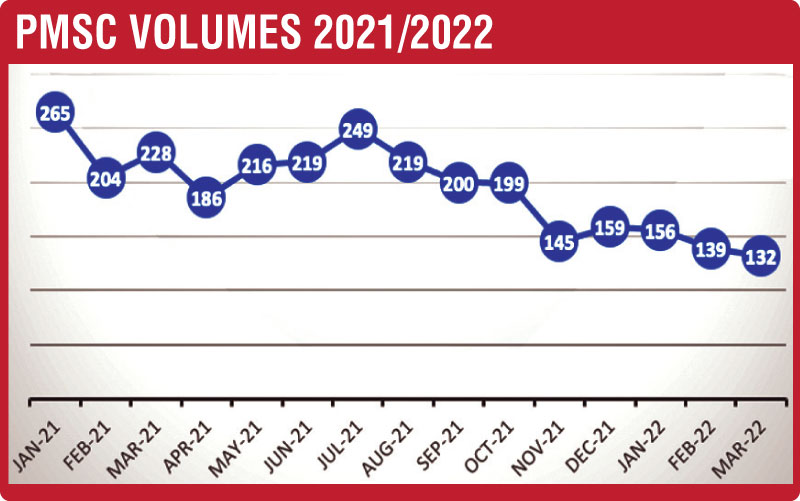Wednesday Feb 18, 2026
Wednesday Feb 18, 2026
Monday, 23 May 2022 00:00 - - {{hitsCtrl.values.hits}}

Analysis by CASA
The escalation of pirate attacks in the Somalia straits along the coast of Somalia into the Gulf of Aden, saw the birth of maritime security in this region. These pirates started boarding ships, seizing goods and kidnapping crew. Due to limited Naval surveillance in international waters it led to Ship Owners and Charterers seeking additional security protection for their vessels and cargoes transiting through the high-risk areas. With the increase of attacks, insurance companies insisted that vessels should take additional insurance premiums as well as to engage armed security onboard. Therefore, to avoid the threat of piracy, companies in the maritime industry started providing armed security services for vessels to protect the crew, cargo as well as the ship.
On board security team (OBST) operations was a concept bought up by the Sri Lanka Navy at the end of the war and during discussions with the United Nations at various seminars that the Sri Lanka Navy attended overseas. Sri Lanka Navy was well-known as one of the most robust and well-experienced security teams in small boat combat in the world.
During the 30-year civil conflict, Sri Lanka Navy played a vital and important role in providing security for ship convoys to North that carried essential goods by keeping terrorist infiltration in attacking such convoys at bay which was considered to be much treacherous than the Somali pirates. This experience was made use by Sri Lanka Navy to develop a concept of establishing on-board security teams for the commercial shipping sector, which was accepted and endorsed by the United Nations.
This led Private Maritime Security Companies (PMSC) setting up their operations under the supervision of Sri Lanka Navy to protect the ships sailing from Malacca straits to Gulf of Aden, by providing onboard security teams.
The seas around Sri Lanka, contain one of the busiest shipping corridors in the world with vessels travelling from Asia across the Arabian Sea, into the Gulf of Aden and through the Suez Canal towards Europe and America.
Due to its geographical location Galle was the most preferred location for PMSC operations which started in 2010. Galle became the main hub through which armed guards embarked and disembarked at OPL (Outside Port Limits). With the blessings of the government of Sri Lanka, Sri Lankan Navy took the initiative to monitor the operations and facilitate storage of weapons in the Naval Armory in Galle.
After 2010 the demand for the security for the vessels grew and the volumes also increased gradually. With this development, the foreign revenue for the country increased rapidly through PMSC operations with additional revenue being generated from providing husbandry services by the Shipping Agents for vessels that were calling at Galle OPL. However, with the decrease in pirate attacks and after evaluating the risks, the International Maritime Organization (IMO) decided to reduce the high-risk area in 2015, which resulted in a drop of the use of Galle for PMSC operations too.
With the reduction of the high-risk area commercial ship owners, they shifted their focus to contract armed guards from Floating Armouries. The reason behind it was that since the high-risk area had been reduced it would be more economically viable for the ship owners to use the floating armouries and avoid the additional charges/expenses incurred by deviating the ships course to conduct embarkation and disembarkation at Galle.
Floating armouries offered facilities such as offshore storage of weapons, ammunition and security equipment and offered very much competitive storage charges compared to Galle along with food and accommodation for the Sea Marshals in the floating armoury itself. In addition to storage charges, ship owners had another cost saving by not requiring any agents’ services, requirement for use of service boats and additional accommodation charges in land accommodations, food, and medical for Sea Marshals engaged in vessel protection.
Prior to 2015, Galle handled a volume of around 600-800 movements per month which came down to 400-500 movements per month after the reduction in the high-risk area in 2015. With the help of all the service providers Galle managed to maintain the volumes of 500 movements per month until the outbreak of the pandemic in March 2020. Due to the constant changes of the regulations and procedures by the authorities due to the pandemic, an uncertainty was created in the minds of PMSCs as well as the ship owners resulting in a drastic drop of volumes that Galle enjoyed.
With this uncertainty the floating armouries prospered with increased volumes paving the way for further reductions in floating armoury rates offered and also by offering free accommodation for Sea Marshals on board these floating armouries. With the reduction in floating armoury rates in 2021, Galle volumes further reduced to around 200-250 per month, simultaneously it led to loss in the volumes of other husbandry services offered to vessels
Currently the armoury in Galle is handled by Avant Garde Maritime Services (AGMS) a private organisation under a Joint Venture (JV) between Rakna Arakshaka Lanka Ltd., (RALL) and Avant Garde Maritime Services Ltd., (AGMS). The operations of the armoury were handed over to AGMS by the Sri Lanka Navy in 2021 and due to uncompetitive rates offered, Sri Lanka has not been able to compete with floating armouries in the region, thus losing volumes significantly to such floating armouries.
As a result of which Sri Lanka is also losing out valuable foreign currency which could’ve been brought into the country specially in difficult times.
Therefore, if Sri Lanka is able to attract more PMSC operations and regain the lost volumes it would help increase other husbandry services and bring in much needed foreign currency which is the need of the hour.
